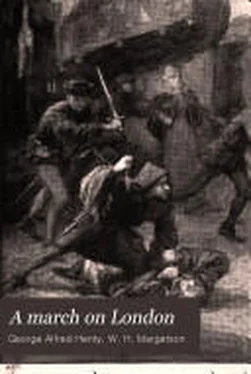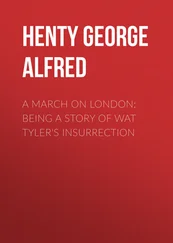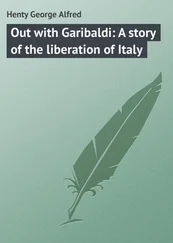“I know not, Sir Ralph,” Albert said. “They were given to us by Mynheer Van Voorden, and he charged us not to open them until we arrived here.”
“It is a mystery, then!” Aline exclaimed. “Let us send for them and open them at once. I am glad one of the boxes was not given to me to take care of, for I am afraid I should never have had the patience to wait until I arrived here before opening it.”
Sir Ralph ordered the boxes to be brought in. “They are light enough,” he said, “and I should judge from their weight that they contain papers of some sort. Open yours first, Albert.”
They were fastened by three skeins of silk, the Fleming's seal being affixed to the knots.
“Cut them, Albert!” Aline exclaimed, as her brother proceeded to break the seals and untie the knots.
“No, no,” he said; “silk is not to be picked up on the wayside, and it will be little trouble to undo them.”
Indeed, in a minute he had unfastened the knots and raised the lid. At the top lay a piece of paper, on which was written, A slight testimony of gratitude for inestimable services rendered to yours gratefully, John Van Voorden . Underneath was a roll of parchment.
“What have we here?” Sir Ralph said. Albert ran his eye over the crabbed black-letter writing, and gave an exclamation of surprise.
“Now, then, Albert,” Aline exclaimed, impatiently, “don't keep it all to yourself. We are burning to know what it is all about!”
Albert made no reply, but continued to read. “It is an assignment to me,” he said, at last, in a low and agitated voice, “of the lands, castle, messuages, tenements, etc., of Cliffe.”
Sir Ralph leapt to his feet. “A princely gift, Albert! The lands are four times as large as mine, and as I have heard, a fair castle has been rising there for months past. Art sure that there is no mistake?”
“There can be no mistake in the deed, father; but can I accept such a gift at the hands of the Fleming?”
“That you can, my son, and without any hesitation. Van Voorden is known to be the richest Fleming in England. He has on various occasions lent vast sums to the king and council, and noble as the gift is, it is one that he can doubtless well afford. You have saved the lives of himself, his wife, and daughter, and he may well feel grateful. He told me when he gave you that suit of armour that it was no recognition of what he felt he owed you, and that he hoped in the future to discharge the debt more worthily. Now, Edgar, let us see what is in your box.”
Edgar had been quietly untying the knots of the silk, and the box was already open. The words on the top were similar to those in Albert's box.
“Please read it, Albert,” he said, handing over the parchment. “You can decipher the characters better than I can.” Albert read it through to himself.
“'Tis similar to mine,” he said, “and assigns you the land, manors, the castle, and all rights and privileges thereto appertaining of the hundred of Hoo.”
“Bravo, bravo!” Sir Ralph exclaimed. “Another noble gift, and fully equal to that of Albert. This Fleming is a very prince. I congratulate you, Edgar, with all my heart. I had heard that Sir John Evesham had sold his estates, which comprise the whole hundred of Hoo, a year since, in order to live at Court, but none seemed to know who was the purchaser. I heard, too, that a large number of men had been employed in building a castle on the heights looking down the Medway past Upnor to Chatham. Why, lads, if you ever win to the rank of knight banneret, you will have land enough to support the dignity, and to take the field with two or three knights and a fair following of men-at-arms in your train. I have gained good sums for the ransom of prisoners, but I never had the luck to save the life of a Flemish merchant and his family.”
“It seems well-nigh impossible,” Edgar said.
“You must remember, Edgar, that these rich Flemings are the bankers of half the princes in Europe. You, who have been in their houses, know that they live in comfort and luxury such as none of our nobles possess. They could find the money for a king's ransom, or pay beforehand the taxes of a country. If a king can grant estates like these to his favourites, and not only the king, but many of our nobles can do so, it is not strange that one of the richest of these Flemings should make such gifts to those who have saved his life without feeling that he has in any way overpaid the service.”
“I must be riding on now,” Edgar said, “to carry this wonderful news to my father.”
While they had been dining, Hal Carter had been getting a hearty meal in the kitchen, where he and Albert's two retainers were surrounded by all the men-at-arms, who were anxious to hear the details of the expedition. When Edgar sent down for his horse, Sir Ralph went down with him to the courtyard, and as Hal brought the horses round, the old knight put his hand upon his shoulder.
“My brave fellow,” he said, “I have heard how you stood with your master across my son's body, and how doughtily you fought. Do not forget that I am your debtor, but for the present I can only say that I thank you for the part you played.”
“It would have been strange, indeed, Sir Ralph, had I not hit my hardest, for my own life depended upon it, and it was not like that I should draw back a foot when Sir Albert, whom I love only next to my master, was lying there; but, indeed, it was a right merry fight, the only one that came up to my expectations of what a stiffly fought melee would be. I would not have missed it for anything.”
CHAPTER XIX.
WELL SETTLED
“Well, well, well,” Mr. Ormskirk exclaimed when Edgar brought the story of all that had happened since he had been away to an end, “indeed you surprise me. I know that many knights fit out parties and go to the wars, not so much for honour and glory as for the spoils and ransoms they may gain, and that after Crecy and Poictiers, there was not a single soldier but came back laden with booty and with rich jewels, gold chains, and costly armour, gathered from the host of French nobles who fell on those fields; while knights who were fortunate enough to capture counts, earls, or princes, gained ransoms that enabled them to purchase estates, and live without occasion to go further to the wars during their lives. But I never thought that you would benefit by such a chance. As it is to my mind more honourable to save life than to take it, I rejoice that you have come to your fortune, not by the slaying of enemies, but by the saving the lives of a man, his wife, and daughter, who are rich enough to reward you.
“Assuredly, if a man like Mynheer Van Voorden had fallen into the hands of the Count of Flanders, the latter would have extracted from him, as the price of his freedom, a sum many times larger than that which he has expended on the purchase of these two estates, and the building of the castles. Well, Edgar, I congratulate you heartily. You can now ride to the wars when the king's banner is spread to the winds, and do your duty to your country, but there will be no occasion for you to become a mere knight adventurer—a class I detest, ever ready to sell their swords to the highest bidder, and to kill men, against whom they have no cause of complaint, as indifferently as a butcher would strike down a bullock with a pole-axe.
“Between these men and those who fight simply in the wars of their own country, the gulf is a wide one, as wide as that betwixt a faithful house- dog and a roving wolf. When are you going to receive your new acquisition, or are you intending to ride first to London to thank the Fleming for his noble gift?”
“Assuredly, we should have first ridden to London, father, but we each found in the bottom of our boxes a short letter which we had at first overlooked. The letters were the same, save for our names. Mine ran:—
Читать дальше












